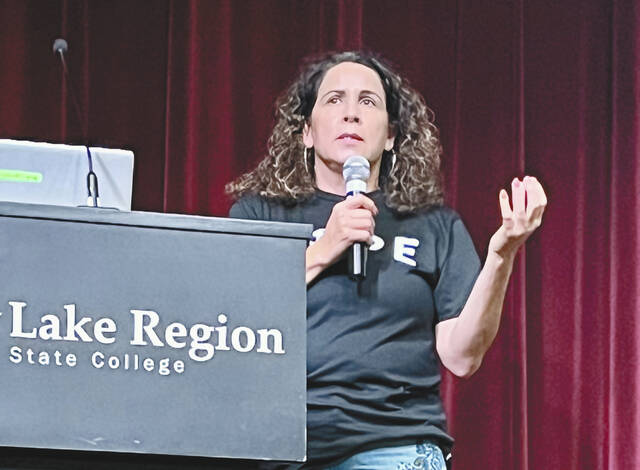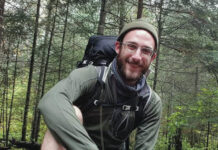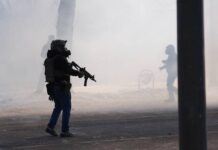The Lake Region Mental Health Summit was held free and open to the public Friday and Saturday, Oct. 10-11 at Lake Region State College, sponsored by the college, the Lake Region Suicide Prevention Coalition (LRSPC) and the Devils Lake Area Foundation. According to one of the event’s organizers, Sean Roed, Paramedic and Director of Operations of the Lake Region Ambulance Service, the summit was focused on strengthening mental health awareness, trauma-informed care and community resilience across the area, bringing together professionals, parents, educators, first responders and community members for a series of presentations, interactive workshops and breakout sessions led by experts in the field.
Fellow organizer Pastor Kevin Anderson of River of Life Assembly of God, who gave the closing keynote, said the project came together quickly after some deliberation. “We’ve been talking about it for a while,” he said.
Anderson added that they organized a similar event in 2017. “It takes a lot of legwork. Really, it came together pretty quickly because Sean is part of our coalition, he had … a connection with a lot of these speakers.”
Dr. LaVonne Fox, the project director and youth outreach specialist for ND THRIVES, an organization devoted to rural and tribal youth suicide prevention, participated in two presentations at the event. One of her goals is to build relationships with other organizations focused on suicide prevention and providing mental health care
“My hopes for the summit was just to get information out about what ND THRIVES can provide,” she said. “One thing I’m really working on is trying to bring people together and make those connections. I think if we came together, we’d be able to do much more with maximizing our resources.”
Her first presentation was an interactive workshop on Friday called “Hope-Anchored Storytelling: Uplifting Narratives for Recovery,” which explored the power of storytelling as a pathway to healing and resilience, then on Saturday she gave a lecture entitled “Mental Health Professionals – Impact of Historical Trauma on Community Service Trust and Utilization Indigenous Populations,” for exploring how such trauma stemming from colonization, forced assimilation and systemic oppression continue to affect indigenous and other minority groups, contributing to mistrust of health and social services, further impacting mental health and creating barriers to accessing care.
Topics covered on the first day of the summit included a keynote presentation by Dr. Rachel Navarro called “Building Resilience After Trauma,” which focused on rebuilding communities impacted by difficult ordeals through healing. Attendees of “What Happens When You Call 988” explored the inner workings of crisis response, while social worker Sarah Kemp Tabbut held a workshop on both days about suicide prevention training called “Question, Persuade, Refer.”
One of the attendees was Penelope Yankton, program director of the Spirit Lake Suicide Prevention Program. “My expectations were to learn … to also make connections with the individuals, the presenters, here at the summit, but also to get updated a little bit more with the connections in the community, since I’m fairly new to this program,” she said. “Also, I brought my staff with me too, so they kind of made those connections as well.”
Anderson said the first priority of the summit as well as their coalition is suicide prevention, to make resources available to the community so that people are aware of the signs. “If we can get those resources into the hands of people that are not the mental health professionals … we’re going to be huge.”
However, Anderson added that assistance and encouragement must also be provided for mental health professionals. “Some of this is from surveys we’ve taken, because we’ve got great mental health professionals in our community, but they’re all maxed out. … There are so many people that are needing help,” he said. “Who’s keeping them encouraged? Who’s keeping them focused … (telling the mental health professionals) ‘Hey, you’re doing a good job,’ because they don’t get a lot of that.”
While the turnout on Saturday was smaller than the attendance on Friday, summit organizers hope to learn from the experience to figure out how to proceed next year. “We were kind of experimenting with the days,” Anderson said, adding that for many attendees, it was a way of continuing necessary education on an important subject. “Friday … they were able to take time off. You know, their employers, they recognize (the importance) so they take the time off. And Saturday, we knew that was a roll of the dice because here Saturdays can be kind of sacred, but we wanted to make it available for parents, for community … that can’t take time off during the week.”
Nevertheless, Anderson feels they’ve achieved the goals set for this summit and hope to hold the event again next year. “You know, it’s kind of shoot for the moon and hope you hit the stars.”
Statement from Penelope Yankton, Program Director – Spirit Lake Suicide Prevention Program
Attending the Lake Region Mental Health Summit was an inspiring and educational experience that reinforced the importance of collaboration, compassion, and cultural awareness in promoting community wellness.
The sessions on building resilience after trauma, online safety and digital wellness, QPR suicide prevention, and understanding what happens when someone calls 988 all offered practical tools that can be brought back to our local communities.
The most powerful part of the summit was the conversation around the impact of historical trauma and how it continues to affect trust and service utilization within Indigenous populations. These discussions reaffirmed my commitment to ensuring our programs remain culturally responsive and community driven.
I am leaving this summit with renewed motivation to turn awareness into action — to continue supporting healing, prevention, and positive change for our youth and families throughout Spirit Lake and the surrounding region.





